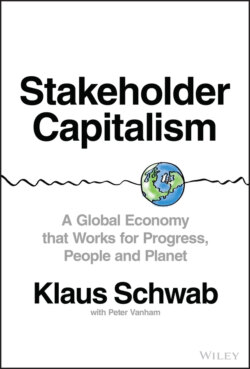Читать книгу Stakeholder Capitalism - Klaus Schwab - Страница 16
The Collapse of a System
ОглавлениеFrom 2007 onward, the global economy started to change for the worse. The world's major economies saw their growth motors sputter. The US went first, with a housing and financial crisis turning into a Great Recession that lasted several quarters. Europe followed next, with a debt crisis that started in 2009 and lasted several years. Most other global economies were caught in the middle, with a global recession in 2009 and real economic growth that hovered around between 2 and 3 percent in the following decade. (Specifically, between a low of 2.5 percent in both 2011 and 2019 and a high of 3.3 percent in 2017, according to the World Bank.24)
Slow growth now seems the new normal, as the motor of all economic growth, productivity gains, is lacking. Many people in the West are stuck in low-paying, insecure jobs, with no outlook for progress. Moreover, the IMF had already noted well before the COVID crisis that the world had reached unsustainable debt levels.25 Anno 2020, public debt, which had previously reached a high in the 1970s crises, was again at or near record levels too in many countries. According to the IMF's 2020 fiscal monitor, public debt in advanced economies reached more than 120 percent of GDP in the wake of the COVID crisis, an increase of over 15 percent in a single year, and in emerging economies shot up to over 60 percent of GDP (from just over 50 percent in 2019).26
Finally, more and more people are questioning even how useful it is to pursue growth as an indicator of progress. According to the Global Footprint Network,27 1969 was the last time the global economy didn't “overspend” nature's resources for the planet. Fifty years on, our ecological footprint is greater than ever, as we use up more than 1.75 times the resources the world can replenish.
All these macroeconomic, social, and environmental trends are mirrored in the incremental effects of decisions taken by individuals, companies, and governments, both local and national. And it confronts those same societies, which have come so far from the era of wars, poverty, and destruction, with an unpleasant new reality: they grew rich but at the expense of inequality and unsustainability.
▪▪▪
Swabia in the 21st century, is in many ways as wealthy as it has ever been, with high wages, low unemployment, and many leisurely activities. The beautiful city centers of Ravensburg and Friedrichshafen in no way resemble the sorry state they were in in 1945. Ravensburg still provides a welcome for refugees, but this time the wars are further afield. Even the city's puzzle game manufacturer has adapted to a world of global supply chains and jigsaws disrupted by digital gaming.
But the puzzle the people of this region, its drivetrain and jigsaw manufacturers, and other societal stakeholders here and in other parts of the world have to solve is not an easy one. It is a global one, with many complex and interdependent pieces. So before we attempt to solve it, we need to list those pieces. It is this assignment that we will take on in the next chapter. And to guide us, we will get the help of a famous economist.
